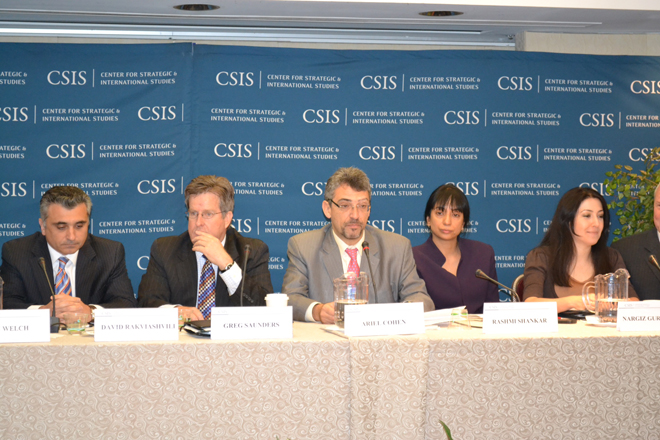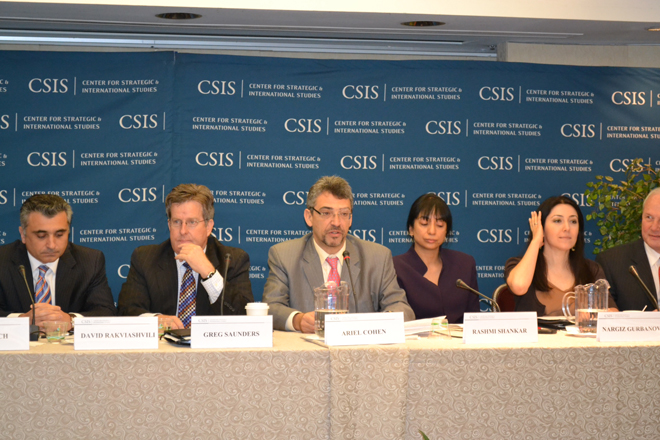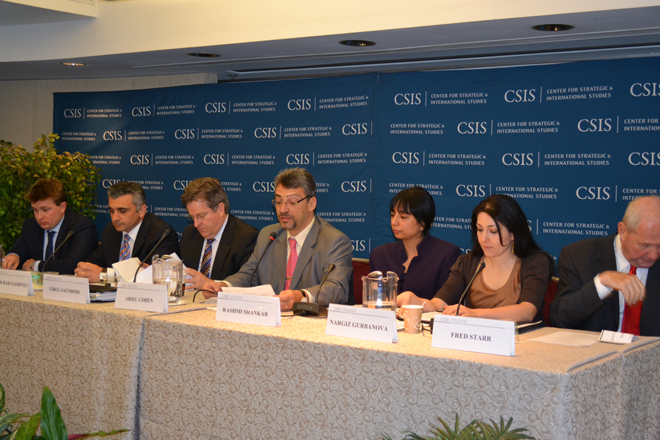USA, Washington, Mar. 28 /Trend special corr. Natalie Zajicova/
A conference titled "Prospects for Prosperity in the Caspian Basin: Energy, Reform, and 20 years of Diplomatic Relations with the U.S." which took place on Tuesday, March 27th at the Center for Strategic and International Studies (CSIS), leading US think tank.
Experts representing policy, business, and diplomatic communities, as well as leading international institutions such as the World Bank shared their opinions on the economic development in the region over the last two decades.
As could be expected, large portion of the conference was dedicated to the role energy resources play in the domestic politics and development of each country, as well as regionally and internationally. As Professor Fred Starr of the Central Asia-Caucasus Institute of the School of Advanced International Studies (SAIS) of Johns Hopkins University pointed out, much of the economic and political success of the region can be credited to the Baku-Tbilisi-Ceyhan (BTC) pipeline, results of which support the prosperity and sovereignty in this major energy corridor.
Energy cooperation has had a trickle down effect in the whole region. The series of deals between Baku and Ankara and the fact that the State Oil Company of Azerbaijan, (SOCAR), is the largest taxpayer in Georgia are just two of many examples. Dr. Nargiz Gurbanova, Economic Counselor at the Embassy of Azerbaijan in Washington said; "we want to make the region an area of cooperation, not of competition." Her sentiments were shared by the other panelists.
From an economic standpoint, the vast natural resources have made it possible for the countries bordering the Caspian Sea to experience dramatic growth and impressive reduction in poverty rates. These nations are determined to reinvest the energy profits into domestic efforts that will strengthen human capital, diversify the economy, and enhance the efficiency of the government. For example, Azerbaijan's model for future economic development in outlined in the government's strategy Azerbaijan 2020. Azerbaijan also aspires to become the largest foreign investor in Turkey in the foreseeable future. Turkey is one of the MIST countries (Mexico, Indonesia, South Korea, and Turkey), the next group of large emerging economies. In Turkey, exports have risen dramatically and the Turkish economy is currently the 16th in the world, with aspiration to be in the top 10 in the foreseeable future. Turkish growth rate is second worldview only to China, and new industrial centers are growing at a rapid rate.
As oil production begins to plateau, the countries of the Caspian need to adopt new growth models based on economic diversification. Experts from the World Bank, Dr. Rashmi Sharkar, Azerbaijan and Georgia Senior Economist, and Ben Welch, the Turkey Country Officer, addressed the need to diversify the regional economies and to transform their wealth from natural resources-based model into long-term sustainable development in order the avoid the so-called Dutch disease.
In Azerbaijan, the State Oil Fund, and in Kazakhstan, the Sovereign Welfare Fund, have been playing an active role in an increase in public spending, especially in infrastructure and construction, which are important forces behind growth. To ensure continuous development and stability, the budding middle class has to be provided with opportunities to satisfy their growing aspirations, including entrepreneurship and education.
Building a diversified economy will require a stable business environment that attracts wide range of investors, fosters well-functioning and transparent institutions, encourage entrepreneurship, enables innovation, and offers highly skilled and competitive workforce. Georgia provides an example of successful and rapid transformation of the business environment, and of strengthening market institutions. Dr. Ariel Cohen, Senior Fellow at the Heritage Foundation who chaired the panel remarked about the region "economic tradition, education, and resilience are sufficient to create elites who emphasize not only business, but also culture and the arts."
Greg Sauders, Senior Director at BP summarized: "it is absolutely extraordinary what has happened in the last 20 years." Now is the time for the countries in the region to integrate regionally and to connect on commercial, economic, cultural and political levels, Saunders concluded.











